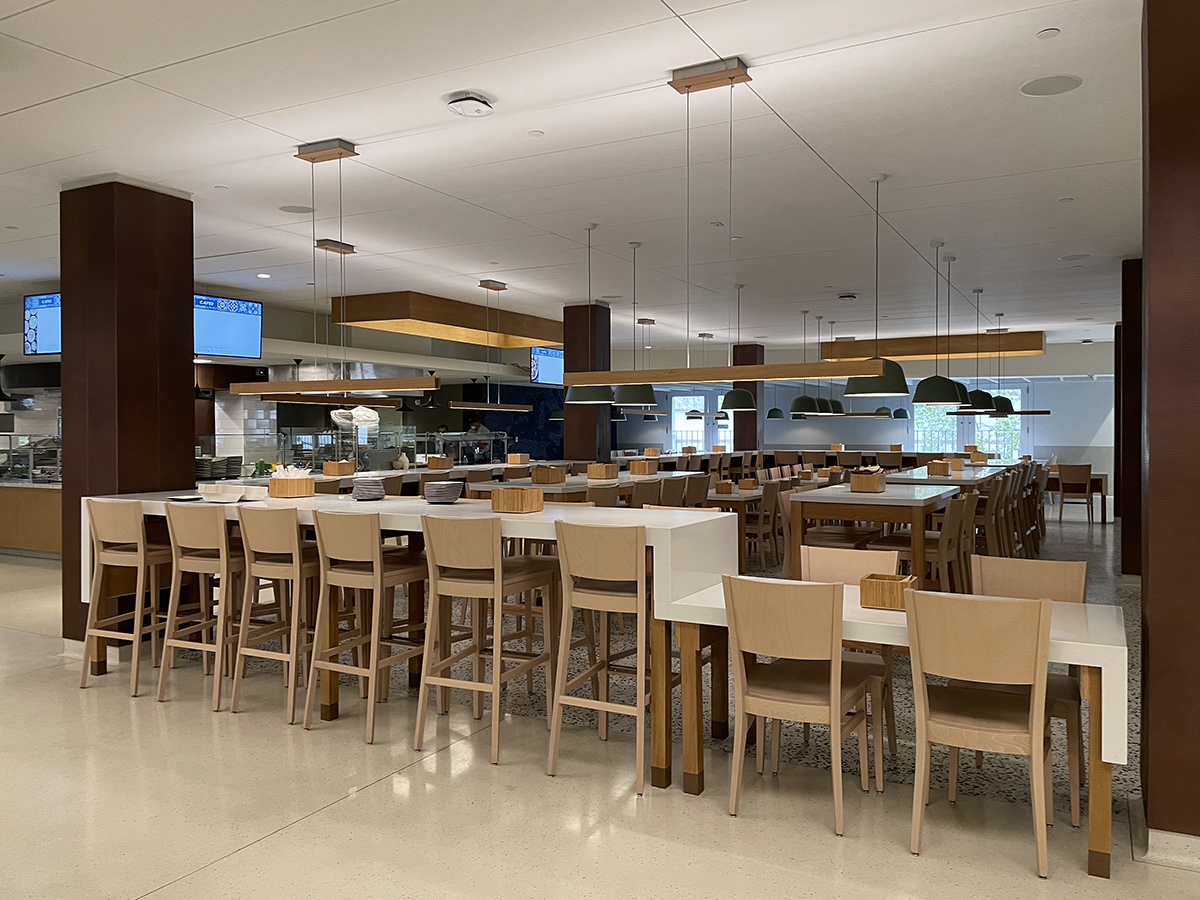Five thousand, two hundred and forty-four dollars: the amount listed on my BruinBill for 14 meals a week, down the drain.
There’s chicken, beef, pork, lamb, you name it, but only one or two dishes that are labeled halal. So most days I’m stuck between being an unwitting vegetarian or pescatarian. I’m paying the same as the students in line with me, but the foods I can eat seem to be an afterthought. Compared to them, it’s hard not to feel frustrated, excluded and invisible.
The lack of halal dining options on the Hill counters UCLA’s mission to create an inclusive environment for all students and their different needs.
Currently, Epicuria is the only dining hall that consistently offers halal food, said UCLA Dining Services in an emailed statement. Even so, it offers only the same three options, all of which are prepackaged frozen meals that are heated upon request.
Arabic in origin, “halal” means permissible or lawful. Meat needs to be slaughtered in a process called zibah in order for it to be certified halal, although there are some meats, such as pork, that will never fall into this category. Zibah refers to cutting through the jugular vein, carotid artery and windpipe in order to drain the animal carcass of blood. A dedication must also be recited during this process. Only then does the meat adhere to Islamic law and become halal.
Based on two major surveys, the University of California Undergraduate Experience Survey and Student Affairs Graduate and Professional Student Survey, provided by UCLA spokesperson Katherine Alvarado in an emailed statement, UCLA has approximately 800 Muslim students, with a little over half being undergraduates. These surveys relied on voluntary responses, so the actual number of Muslim students may be greater than reported.
Seeing that UCLA is home to a significant Muslim population, it is important that the university build a more accommodating community on the Hill and introduce more halal dining choices. Muslim Bruins are paying thousands of dollars for their meal plans and should be able to access healthy halal food without going off campus or modifying their diets.
It’s currently difficult for Muslim students to find a variety of halal options at the dining halls.
“I haven’t really found that many halal options. … Actually, only one halal option, which occurs once every week in (De Neve Residential Restaurant), where they serve the lamb,” said Mahnoor Wani, a second-year human biology and society student. “I’ve been having a vegetarian diet because I can’t really eat the meat there.”
Some vegetarian options aren’t even viable for Muslim students because of the way the dishes are prepared.
“A lot of the items they do have in the dining halls are made with alcohol,” said Gibran Hassan, a third-year biochemistry student. “Ever since (Covel Commons Residential Restaurant) became Epicuria, I assumed they would have more options because (it’s) more Mediterranean-themed and (takes more) aspects of those cultures, but they don’t have a lot of halal food.”
What limited options the dining halls offer are also not communicated well to the student body.
Along with the prepackaged halal meals at Epicuria that are available during lunch and dinner, all the lamb served is also certified halal, Alvarado said.
However, Wani added that she wasn’t aware of the fact that Epicuria had prepackaged halal meals or the fact that all the lamb at UCLA is certified halal.
There are also inconsistencies when students try to look at the online dining menus posted on the UCLA mobile app or housing websites in order to identify the halal dishes for a certain day. Sometimes the halal identification will pop up next to a Caesar salad dish but not other salads or vegetarian dishes.
“Sometimes (dining halls) would have (a halal label) on the whole lamb or whole chicken that was cooked with alcohol,” said Hamza Mirza, a fourth-year history student and treasurer for the Muslim Student Association. Mirza also added that sometimes the opposite problem occurs, and dishes that seem to be halal based on the ingredients list aren’t labeled as such.
For students with dietary restrictions due to their beliefs, incorrect labels can be emotionally distressing and make it even harder to find permissible dishes.
While UCLA has tried to make some effort to be transparent, word-of-mouth from upperclassmen has helped students navigate the options available to them on the Hill. However, the pandemic has virtually eliminated that information source.
“Now, pretty much everyone who (has) eaten on the Hill before is living in apartments,” Mirza said. “Even if I try to tell people, ‘This is where these things should be,’ it’s a lot harder than if I were just to go with someone to the dining hall.”
That’s not to say UCLA hasn’t been working to improve the dining experience for Muslim students. However, the COVID-19 pandemic has made it more of a challenge.
Before the pandemic, there were more halal food options on the Hill.
During his sophomore year, the burgers at Covel were halal, while many other dining halls started using more halal meat in dishes, such as lamb curry at Feast at Rieber or tri-tip meat at Bruin Plate, Mirza said.
Business closures during the COVID-19 pandemic have made it harder for UCLA to get supplies, which in turn has made it more difficult to offer halal foods for Muslim students.
However, the Muslim Student Association is negotiating with UCLA Dining Services to bring more options to the Hill, and UCLA is working to find more halal vendors.
These are steps in the right direction, but UCLA owes it to the Muslim student community to continue working to make these changes a sure reality.
We deserve to feel included.


